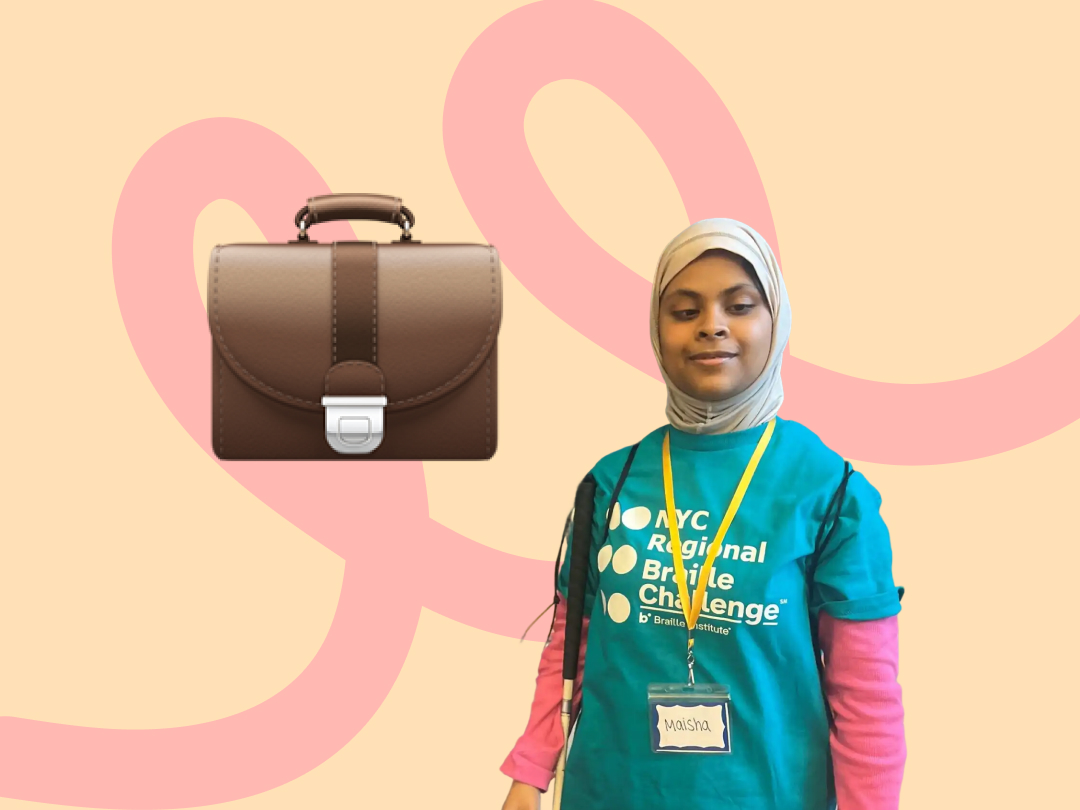Go beyond the usual advice with personal insights and tools for acing your job interview as a blind person.
September 8, 2025

Today, let's talk about working blind. This blog will cover blindness-related interview skills and how to handle your job once you get it. Before you skip over this, thinking I'm just going to tell you to "do your research" and "practice mock interviews," I promise to share things I wish I had read before my own interviews, from middle school to my first job. I will, however, mention some tools that made those tasks a reality for me, but it won't be what you’re expecting.
Obviously, one of the first steps to interview prep is doing research about the company to come up with questions to ask and show off your knowledge. I use JAWS, a screen reader for Windows devices, to surf the company website. JAWS verbalizes all the on-screen information, but since it doesn't describe images, I use the Envision app so it can use my camera to describe them to me. This way, I don't miss any information.
Once my research is done, I have a bunch of mock interviews. I use the free Ally app (iOS, Android) for this, and it’s nothing like just Googling interview questions. When you Google them, you have all the time in the world to come up with answers before moving on. That's not how a real interview works. Instead, I use Ally to simulate a real-time interview, and if I get stuck, I can even ask Ally for help. I use "Tom" for interview prep because his personality is "Professional and charming" (as described in the Ally app). He also gives me honest feedback on my performance—an honesty you might not get from a sweet friend.
Here are some things to remember when you're facing the person who will have an impact on your career:
Blindisms are common habits that are exclusively related to blindness. These include sticking your fingers in your eyes, speaking too quietly or loudly, and rocking back and forth. Exhibiting these behaviors can give the impression that you are not confident or are absent-minded.
Sometimes, even after doing everything right, you might get questions that show the interviewer is unsure whether you are competent or can fit into the company culture. This means the interviewer is being ableist, likely without even realizing it. While it's easy to spot, it's important to maintain your composure. You can handle this by appearing enthusiastic and subtly integrating your adaptive tools to achieve the same results as your sighted peers.
While there's no guaranteed way to wipe the floor with ableist bosses, just know that if you’re not hired because of it, it’s the company’s loss, not your fault. This took me a long time to realize. When I first encountered ableism, I thought it was something I was doing wrong. But then I saw it from a new perspective: If a company refused to hire me because of my race or gender, would that be okay or somehow my fault? No. So not being hired because of my disability is not my fault either. Ableism will come and go, whether it's from bosses or colleagues. I've found that approaching this challenge like any other makes it easier to handle. By maintaining professionalism while acknowledging the struggle, you can exhibit a sense of confidence and resourcefulness that may take your coworkers by surprise. When they assume you can't do a certain task, offer to help and explain how you can do it with your adaptive tools. You can even offer to demonstrate, all while remaining respectful and resilient.
Before your first day, you will likely have an idea of what online platforms your job will require you to use. I recommend preparing in advance by testing for accessibility and finding solutions if a platform is inaccessible. My favorite solution is to turn to either the Ally app. As mentioned earlier, I use Ally to describe images that JAWS cannot. I also use Envision to read text that JAWS skips over (which sometimes happens with inaccessible websites) and to scan and read aloud print on paper.
I recommend getting familiar with the HR department as much as possible. Knowing their contact information is important in case a situation arises where you need a mediator. Workplace conflict can get out of hand, and ableism is no different. However, the third party doesn’t have to be HR, because sometimes, people in HR can exhibit ableism too. I have found organizations like the National Federation for the Blind (NFB), American Council for the Blind (ACB), and the American Foundation for the Blind (AFB) to be quite helpful. They offer events that help blind and visually impaired people foster adaptive skills. The Commission for the Blind can also refer you to social services that can help you navigate your emotions during these conflicts and find legal assistance or support groups if needed.
First off, I wish you the best of luck on your job journey. Most likely, you won't need to fight legal battles, but it's good to know what to do if it ever comes to that. As real as the nervousness can be, I have found it helpful to stay positive. When I went through the interview process for my first job, I focused on the opportunity to make money, the excitement of meeting new people, and the potential for growth. A friend once told me that by thinking positive, I am making room for it to manifest in real life.